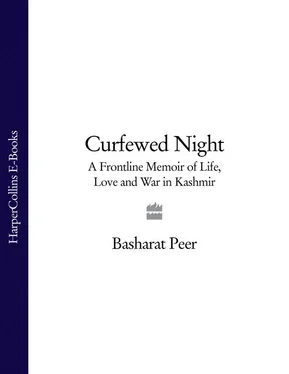CURFEWED NIGHT
A Frontline Memoir of Life, Love
and War in Kashmir
BASHARAT PEER

Harper
Press
In the memory of the boys who couldn’t return home
For Baba and for my parents, Hameeda Parveen and G. A. Peer
Cover
Title Page CURFEWED NIGHT A Frontline Memoir of Life, Love and War in Kashmir BASHARAT PEER Harper Press
Dedication In the memory of the boys who couldn’t return home For Baba and for my parents, Hameeda Parveen and G. A. Peer
Part One - Memory Part One Memory
1 - Fragile Fairyland
2 - Freedom Songs
3 - Very Long Miles
4 - Bunkeristan
5 - Shalimar Express
6 - A Close Call
7 - Situation
8 - The Trial
Part Two - Journeys
9 - I See You Again
10 - City of No Joy
11 - Papa-2
12 - Heroes
13 - Price of Life
14 - In the Courtyards of Faith
15 - The Missing Shiva
16 - The Black Blanket
Epilogue
Acknowledgments
Copyright
About the Publisher
People are trapped in history and history is trapped in people .
—Notes of a Native Son , James Baldwin
The city from where no news can come is now so visible in its curfewed night that the worst is precise:
From Zero Bridge a shadow chased by searchlights is running away to find its body .
—The Country Without a Post Office , Agha Shahid Ali
Part One Memory
I was born in winter in Kashmir. My village in the southern district of Anantnag sat on the wedge of a mountain range. Paddy fields, green in early summer and golden by autumn, surrounded the cluster of mud-and-brick houses. In winter, snow slid slowly from our roof and fell on our lawns with a thud. My younger brother and I made snowmen using pieces of charcoal for their eyes. And when our mother was busy with some household chore and Grandfather was away, we rushed to the roof, broke icicles off it, mixed them with a concoction of milk and sugar stolen from the kitchen, and ate our homemade ice creams. We would often slide down the slope of the hill overlooking our neighborhood or play cricket on the frozen waters of a pond. We risked being scolded or beaten by Grandfather, the school headmaster. And if he passed by our winter cricket pitch, he expressed his preference of textbooks over cricket through his dreaded shout: “You good-for-nothings!” At his familiar bark, the cricket players would scatter in all directions and disappear. School headmasters were feared like military and paramilitary men are, not just by their grandchildren but by every single child in the village.
On winter afternoons, Grandfather joined the men of our neighborhood sitting at the storefronts warming themselves with kangris , our mobile fire pots, gossiping or talking about how that year’s snowfall would affect the mustard crop in the spring. After the muezzin gave the call for afternoon prayers, they left the shop fronts, fed the cattle at home, prayed at the neighborhood mosque, and returned to the storefronts to talk.
Spring was the season of green mountains and meadows, blushing snow and the expanse of yellow mustard flowers in the fields around our village. On Radio Kashmir, they played songs in Kashmiri celebrating the flowers in the meadows and the nightingales on willow branches. My favorite song ended with the refrain: “And the nightingale sings to the flowers: Our land is a garden!” When we had to harvest a crop, our neighbors and friends would send someone to help; when it was their turn, we would reciprocate. You never needed to make a formal request weeks in advance. Somebody always turned up.
During the farming season, Akhoon, the mullah who refused to believe that Neil Armstrong had landed on the moon, complained about the thinning attendance at our neighborhood mosque. I struggled to hold back my laughter when the villagers eager to get back to farming coughed during the prayers to make him finish faster. He compromised by reading shorter chapters from the Quran. Later in the day he would turn up at the fields to collect a seasonal donation—his fee for leading the prayers at the mosque.
In summer, after the mustard was reaped, we planted rice seedlings. On weekdays before we left for school, my brother and I took samovars of kahwa , the sweet brew of saffron, almonds, and cinnamon, to the laborers working in our fields. On weekends, I would help carry sacks of seedlings from the nurseries; Mother, my aunts, and other neighborhood women bent in rows in the well-watered fields, planted, and sang.
Grandfather kept an eye on a farmer whose holdings bordered our farms. We would see him walking toward the fields, and Grandfather would turn to me: “So, whom do you see?” “I see Mongoose,” I would reply. And we would laugh. A short, wiry man with a wrinkled face, Mongoose specialized in things that led to arguments—diverting water to his fields or scraping the sides of our fields with a shovel to increase his holdings by a few inches.
Mongoose, Grandfather, and all the other villagers worried about the clouds and the rainfall. Untimely rain could spoil the crop. If there were clouds on the northern horizon, they said, there would be rain. And around sunset, if they saw streaks of scarlet in the sky, they said, “There has been a murder somewhere. When a man is killed, the sky turns red.”
Over more cups of kahwa , the rice stalks were threshed in autumn. Grains were stored in wooden barns, and haystacks rose like mini-mountains in the threshing fields, around which the children played hide-and-seek. The apples in our orchards would be ready to be plucked, graded, packed into boxes of thin willow planks, and sold to a merchant. Village children stole apples; my brother and I would alternate as lookouts after school. Few stole from our orchard; they were too scared of my grandfather. “If they steal apples today, tomorrow they will rob a bank. These boys will grow up to be like Janak Singh,” Grandfather would say. Many years ago, Janak Singh, a man from a neighboring village, had killed a guard while robbing a bank. He had been arrested and sent to prison for fourteen years. Nobody had killed a man in our area before or since.
On the way home from school on those mid-eighties afternoons, I would often stare from the bus window at Janak Singh’s thatch-roofed house as if seeing it once again would reveal some secret. My house, a three-floor rectangle of red bricks and varnished wood covered by a cone of tin sheets, was just a mile up the road. I would stand on the steps and watch the tourist buses passing by. The multicolored buses carried visitors from distant cities like Bombay, Calcutta, and Delhi; and also many angrez—the word for the British and our only word for Westerners. The angrez were interesting; some had very long hair, and some shaved their heads. They rode big motorbikes and at times were half naked. We waved at them; they waved back. I had asked a neighbor who worked in a hotel, “Why do the angrez travel and we do not?” “Because they are angrez and we are not,” he said. But I worked it out. They had to travel to see Kashmir.
Father had bought me an American comic book dictionary, which taught words using stories of Superman, Batman and Robin, and Flash. I would often read it by the jaundiced light of our kerosene lantern and think that if Flash lived in Kashmir, we could have asked him to fix our errant power supply. I preferred reading the comics to the sums my grandfather wanted me to master. They added new stories to the collection of Persian and Kashmiri legends I heard from my grandmother and our servant Akram—legends such as the tale of Farhad’s love for Shirin. Akram always began the story by saying, “It is said that once upon a time in Iran, there was a most beautiful queen called Shirin …” The young sculptor Farhad was enamored of her and loitered around, seeking a glance of Shirin. Over time Shirin began to develop a liking for him. Her husband, King Khusro, was furious, and his advisers suggested a plan to be rid of Farhad: They told Farhad that Shirin would be his if he could dig a canal from a distant Behistun mountain to the palace. Shirin told Farhad about his impossible task and the artist-lover set off for the mountains with his spade. Farhad toiled alone for years, molding the mountains, crying out the name of his beloved, sculpting Shirin’s face on the rocks along the canal.
Читать дальше













